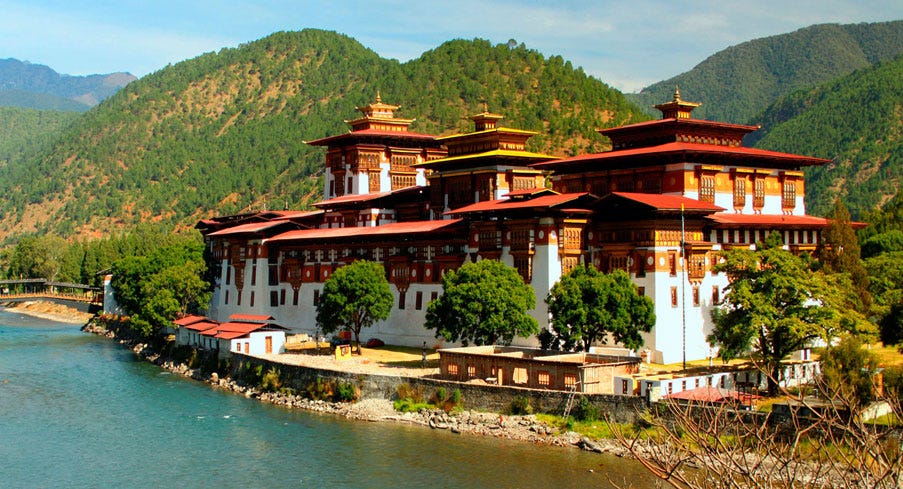Bhutan, the Land of the Thunder Dragon, is renowned for its unspoiled landscapes, rich cultural heritage, and deep spiritual roots. This Himalayan kingdom offers a serene environment for those seeking spiritual solace and cultural enrichment. Whether you are drawn to Buddhism's tranquil monasteries or the Hindu temples scattered across the country, Bhutan has something to offer for every spiritual traveler.
Here’s a guide to exploring Bhutan's most cherished religious places, including Hindu temples and Buddhist monasteries.
1. Buddhist Monasteries and Dzongs
a. Paro Taktsang (Tiger’s Nest Monastery)
Location: Paro
Significance: Perched on a cliff 3,000 feet above the Paro Valley, this iconic monastery is one of Bhutan's most sacred sites. Legend has it that Guru Padmasambhava, a revered Buddhist figure, meditated here in the 8th century.
Visitor Tip: A challenging trek rewards you with breathtaking views and spiritual serenity.
b. Punakha Dzong
Location: Punakha
Significance: Known as the "Palace of Great Happiness," Punakha Dzong is the winter residence of Bhutan's central monastic body. It sits beautifully at the confluence of the Pho Chhu and Mo Chhu rivers.
Visitor Tip: Visit during the Punakha Tshechu festival for vibrant cultural performances.
c. Tashichho Dzong
Location: Thimphu
Significance: Serving as the seat of Bhutan’s government and the summer residence of the central monastic body, this Dzong is a blend of tradition and governance.
Visitor Tip: Explore the Dzong in the evening when it is beautifully illuminated.
d. Gangtey Monastery
Location: Phobjikha Valley
Significance: A 17th-century monastery surrounded by the valley's pristine wetlands, famous for hosting black-necked cranes during winter.
Visitor Tip: Enjoy the peaceful environment and the nearby nature trails.
e. Chimi Lhakhang
Location: Punakha
Significance: Known as the "Fertility Temple," it is dedicated to Drukpa Kunley, a saint famous for his unconventional teachings.
Visitor Tip: Visitors seeking blessings for fertility make special pilgrimages here.
2. Hindu Temples in Bhutan
Although Bhutan is predominantly a Buddhist country, Hinduism is practiced by the Nepali-speaking communities, and several temples cater to Hindu devotees.
a. Shiva Mandir, Samtse
Location: Samtse
Significance: This temple is dedicated to Lord Shiva and is an important site for the Hindu community in Bhutan. The Maha Shivaratri festival is celebrated here with great devotion.
Visitor Tip: Engage with the local community to understand their unique blend of Bhutanese and Hindu traditions.
b. Jangtopelri Lhakhang
Location: Gelephu
Significance: While primarily a Buddhist site, this temple attracts Hindu devotees due to its inclusive spiritual practices.
Visitor Tip: Participate in interfaith discussions and community events here.
c. Kali Mandir, Phuentsholing
Location: Phuentsholing
Significance: Dedicated to Goddess Kali, this temple is a spiritual anchor for Hindu devotees in southern Bhutan. It is particularly vibrant during Navratri.
Visitor Tip: Visit early in the morning to witness the serene rituals and offerings.
d. Vishnu Temple, Gelephu
Location: Gelephu
Significance: A sacred place for devotees of Lord Vishnu, this temple highlights the harmony between Bhutan's Hindu and Buddhist communities.
Visitor Tip: Experience the unique architectural blend reflecting Bhutanese and Hindu styles.
3. Natural Spiritual Sites
Bhutan's spiritual aura extends beyond temples and monasteries, as its natural environment is deeply revered.
a. Dochula Pass
Location: Between Thimphu and Punakha
Significance: The 108 chortens (stupas) at the pass commemorate Bhutanese soldiers and are a symbol of peace.
Visitor Tip: Visit on a clear day for panoramic views of the snow-capped Himalayas.
b. Bumthang Valley
Location: Central Bhutan
Significance: Known as Bhutan's spiritual heartland, the valley is home to several ancient temples and monasteries, including Jambay Lhakhang and Kurjey Lhakhang.
Visitor Tip: Explore the valley during the Jambay Lhakhang Drup festival for a magical experience.
4. Festivals and Cultural Events
Religious festivals, or Tshechus, are integral to Bhutanese spirituality and culture. Key festivals include:
Paro Tshechu: Held at Paro Dzong, featuring traditional mask dances.
Thimphu Tshechu: A grand celebration at Tashichho Dzong.
Haa Summer Festival: Celebrates Bhutan's nomadic culture and spirituality.
5. Practical Tips for Travelers
Dress Code: Wear modest clothing when visiting religious sites.
Respect Local Customs: Remove shoes before entering temples and monasteries.
Permits: Some monasteries require special permits for entry; consult local guides.
Guides: Hiring a local guide can enrich your understanding of Bhutan's spiritual heritage.
Bhutan’s religious and spiritual destinations offer a unique blend of tranquility, cultural richness, and spiritual depth. From the majestic Buddhist monasteries to the sacred Hindu temples, each site tells a story of faith, harmony, and devotion. Whether you’re seeking enlightenment, cultural exploration, or simply a moment of peace, Bhutan promises an unforgettable journey for the soul.
Embark on this spiritual adventure and let Bhutan’s serene beauty and rich traditions inspire you.


